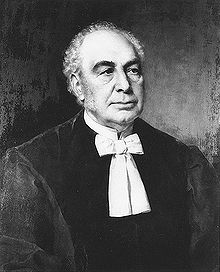- Eduard von Simson
-
Eduard von Simson 
President of the Frankfurt Parliament In office
December 1848 – May 1849President of the North German Confederation's Parliament In office
1867–1871President of the Reichstag In office
1871–1877President of the Reichsgericht In office
1 October 1879 – 1 February 1891Personal details Born 10 November 1810
Königsberg, Kingdom of PrussiaDied 2 May 1899 (aged 88)
Berlin, German EmpireProfession jurist Martin Sigismund Eduard von Simson (November 10, 1810 – May 2, 1899) was a German jurist and distinguished liberal politician of the Kingdom of Prussia and German Empire, who served as President of the Frankfurt Parliament as well as the first President of the German Parliament and of the Imperial Court. He was ennobled by Frederick III in 1888.
Contents
Education
Eduard Simson was born in Königsberg, East Prussia, to Jewish parents. The family converted to Protestantism in 1823. After the usual course at the Gymnasium of his native town, he entered its university in 1826 as a student of jurisprudence, and specially of Roman law. He continued his studies at Berlin and Bonn, and, having graduated doctor juris, attended lectures at the École de Droit in Paris. Returning to Königsberg in 1831 he established himself as a Privatdozent in Roman law, becoming two years later extraordinary, and in 1836 ordinary, professor in the faculty of the university.
National Assembly
Like many other distinguished German jurists, pari passu with his professorial activity, Simson followed the judicial branch of the legal profession, and, passing rapidly through the subordinate stages of auscultator and assessor, became adviser (Rath) to the Landgericht in 1846. In this year he stood for the representation of Königsberg in the National Assembly at Frankfurt am Main, and on his election was immediately appointed secretary, and in the course of the same year became successively its vice-president and president.
Frederick William IV
In Berlin on April 3, 1849, Simson appeared in his capacity of president at the head of a deputation of the Frankfurt Parliament to announce to King Frederick William IV his election as German Emperor by the representatives of the people. The king, either apprehensive of a rupture with the Austrian Empire, or fearing detriment to the prerogatives of the Prussian crown should he accept this dignity at the hands of a democracy, refused the offer. Simson, bitterly disappointed at the outcome of his mission, resigned his seat in the Frankfurt Parliament, but in the summer of the same year was elected deputy for Königsberg in the popular chamber of the Prussian Landtag. Here he soon made his mark as one of the best orators in that assembly. A member of the short-lived Erfurt Parliament of 1850, he was again summoned to the presidential chair.
Prussian Landtag
On the dissolution of the Erfurt assembly, Simson retired from politics, and for the next few years devoted himself exclusively to his academical and judicial duties. It was not until 1859 that he re-entered public life, when he was elected deputy for Königsberg in the lower chamber of the Prussian Landtag, of which he was president in 1860 and 1861. In the first of these years he attained high judicial office as president of the court of appeal at Frankfurt (Oder). In 1867, having been elected a member of the constituent assembly of the North German Federation, he again occupied the presidential chair, as he did also in the first regular Diet and the Zoll-parliament which succeeded it.
William I
On December 18, 1870, Simson arrived at the head of a deputation in the German headquarters at Versailles to offer the imperial crown to the king of Prussia in the name of the newly-elected Reichstag. The conditions under which Prussia might justly aspire to the hegemony in Germany at last appeared to have been accomplished; no obstacles, as in 1849, were in the way of the acceptance of the crown by the leading sovereign of the confederation, and on January 18, 1871 King William I of Prussia was proclaimed with all pomp German Emperor in the Salle des Glaces at Versailles.
Reichsgericht
Simson continued as president of the Reichstag until 1874, when he retired from the chair, and in 1877 resigned his seat in the Diet, but at Otto von Bismarck's urging, accepted the presidency of the supreme court of justice (Reichsgericht), and this high office he filled with great distinction until his final retirement from public life in 1891. Emperor Frederick III bestowed upon Simson the Order of the Black Eagle in 1888.
His grave is preserved in the Protestant Friedhof III der Jerusalems- und Neuen Kirchengemeinde (Cemetery No. III of the congregations of Jerusalem's Church and New Church) in Berlin-Kreuzberg, south of Hallesches Tor.
References
 This article incorporates text from a publication now in the public domain: Chisholm, Hugh, ed (1911). Encyclopædia Britannica (11th ed.). Cambridge University Press.
This article incorporates text from a publication now in the public domain: Chisholm, Hugh, ed (1911). Encyclopædia Britannica (11th ed.). Cambridge University Press.
See also: SimsonEduard von Simson | Otto von Oehlschläger | Karl Gutbrod | Rudolf von Seckendorff | Heinrich Delbrück | Walter Simons | Erwin BumkeCategories:- 19th-century German people
- German jurists
- Prussian politicians
- Members of the Frankfurt Parliament
- University of Königsberg faculty
- Prussian nobility
- Recipients of the Order of the Black Eagle
- Members of the Reichstag of the German Empire
- University of Königsberg alumni
- Humboldt University of Berlin alumni
- University of Bonn alumni
- German Protestants
- Converts to Protestantism from Judaism
- German Jews
- People from Königsberg
- People from East Prussia
- 1810 births
- 1899 deaths
- Knights Grand Cross of the Order of the Zähringer Lion
Wikimedia Foundation. 2010.
